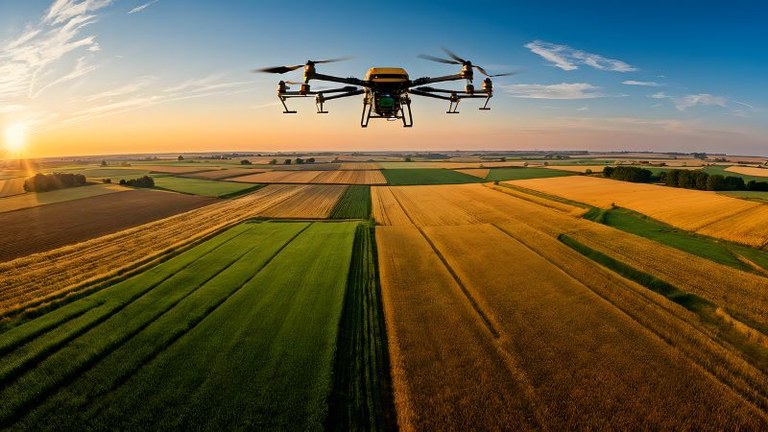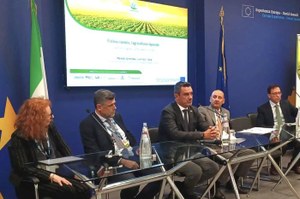Adaptation to climate change in agriculture, Life Ada project comes to an end
The closing event of Life ADA (ADaptation in Agricolture) was held last 29 October 2024 at the European Parliament office in Rome: the project, which started at the end of 2020 and is funded by the European Union with Life programme, is leaded by UnipolSai with Emilia-Romagna Region among the partners.
To achieve the goal of increasing resilience in agriculture and providing adaptation tools to climate change, Life ADA created an innovative public-private partnership between the Region, scientific research institutes, NGOs and organized producers (consortia or cooperatives).
The event “Climate changes, agriculture responds – Life ADA: reacting to climate change” had high-level speakers and authorities, starting from G. Mastrojeni (Deputy Secretary General of the Union for the Mediterranean) as moderator.
Keynote Speeches
V. Fiore, Communication Manager of European Parliament office in Italy, welcomed the participants recalling the increasing interest in the public debate for agriculture, as demonstrated in the first plenary session of the new European Parliament about the future of agriculture.
In the first presentation B. Bacani (Head of the insurance sector of the United Nations Environment Programme UNEP), explained the sustainability guidelines for the insurance sector at different levels of coverage (national, communities/cities and for individuals) hoping for an insurance action plan at a national level.
Bacani also clarified that mitigation (i.e. reducing the causes of climate-change related risk) and adaptation (i.e. managing the effects of such changes in the best way) are not in conflict, on the contrary both of them must be implemented as soon as possible. The difference between 1.5° and 2° increase, in fact, entails dramatic differences in terms of yields, sea level rise and loss of animal and plant species.
Watch the interview to Butch Bacani
In the second speech, B. Kurnik (Head of the Group on Climate Change Impacts and Adaptation, European Environment Agency) presented the Agency, with its network of 32 members plus 6 external countries: the climate data collected across Europe, once processed, can be used in the political and strategic decision making about environment and climate.
The estimated economic losses related to climate change in EU are impressive: 64 billion euros in 2021, 57 in 2022 and 44 in 2023, especially considering that only 20% of them was insured. The primary sector (agriculture and livestock) is the most exposed to climate risks, especially in Central and Southern Europe: prolonged drought, plant pests due to the higher temperature (in Italy the emergency of olive trees) and spring frosts, which can cause enormous damage to fruit production.
UnipolSai CEO M. Laterza focused on the importance of insurance: Italy has the lowest protection gap within the EU and accessibility to insurance for farmers is limited also by the increased costs, a direct cause of the insurance refunds that have doubled in the last few years.
The added value of the project is ADA tool, a web app designed for producers to quantify the risks associated with their business: it integrates different information provided by the farmer, by insurance companies and scientific meteorological data processed in the form of trends and future prospects.
Round table and conclusions
In the round table, C. Fini (President of CIA), C. Maretti (President of Legacoop Agroalimentare N. Italia), G. Felice (Director of the RER Competitiveness sector), S. Caselli (President of Areflh, Granlatte and CRPA) and M. Raffa (Commissioner Arsial Lazio) shared their thoughts.
Watch the interview with C. Fini - CIA
Watch the interview with C. Maretti - Legacoop
Among the lessons learned during Ada project, the need of turnover in agriculture, training and innovation. Emilia-Romagna Region pushes innovation by funding material investments on the one hand and operational groups for innovation on the other. Speaking about innovation, the new genomic techniques (NGTs) were mentioned (safe but not yet authorized in Italy): they could be used to obtain improved plants and reduce water and pesticides; investing many resources in innovation makes possible to get a good level of adaptation.
European farmers, concluded MP D. Nardella, are the pillars of EU self-sufficiency and the key of sustainable employment and growth in rural areas; their contribution is essential for ecological transition, facing the great challenges of adapting to climate change without losing competitiveness.
Watch the interview with MP D. Nardella
The numbers of the Life ADA project
- Total budget: 2 million euros, co-funded by the EU for about half of the amount
- Stakeholders: farmers and Producer Organizations in three agri-food chains: dairy (Parmigiano Reggiano), wine, fruit and vegetables. Project actions implemented first in Emilia-Romagna and then extended to Veneto, Tuscany and Lazio.
- About 600.000 people including farmers, consortia, cooperatives, agronomists, zootechnicians, agricultural economists, public institutions, agrometeorologists reached with training, communication and dissemination initiatives during the project.
- About 1.600 users, farmers and POs used ADA Tool, the web app developed within the project to create an adaptation plan to climate change and different actions.
- 38.000 users of the training resources developed by the project: 10 webinars (7 technical and 3 good practices exchanges), video lessons and podcasts from AgriFuturo series, all available on the project website.
- In 3 regional calls (total financial contribution ~46 million €), a bonus was introduced for those who have a climate change adaptation plan.


